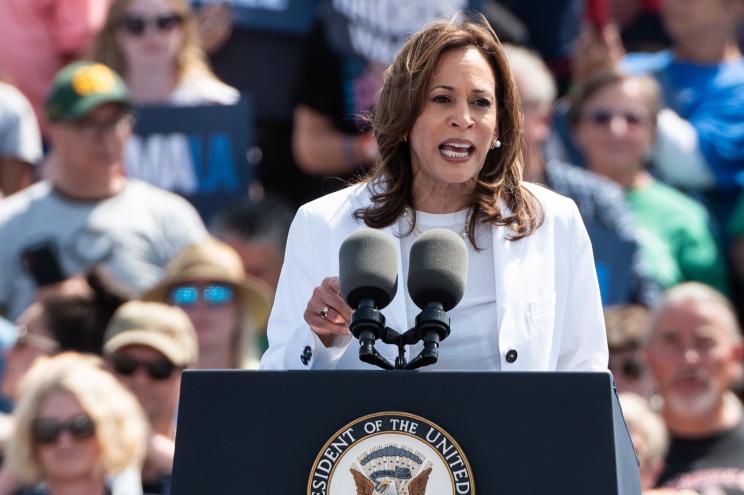During a campaign excursion in the state of Wisconsin, Vice President Kamala Harris decided to employ the term ‘gaslighting’ in an attempt to delegitimize her Republican adversary’s undertaking to present an alternate narrative of the events that transpired on January 6, 2021.
The Vice President took the opportunity to publicly berate the former President, Donald J. Trump, arguing that his characterisation of the tumultuous day as a ‘day of love’ was, in her view, misleading the American public or ‘gaslighting’, as she repeatedly emphasized during her speech. It seems worthwhile to note whether this repetitive use of the word ‘gaslighting’ seems sincere or if it’s just Harris trying to imbue her narrative with emotional force.
According to her, the day was marred with extreme violence which included violent assaults on law enforcement officers, resulting in injuries to over a hundred and alleged deaths. Trump’s portrayal of the day was diametrically opposite, he referred to the day as one of ‘love’. It seems, however, that Harris wants everyone to strictly adhere to her perspective, ignoring the multitude of perspectives a complex event like this naturally spawns.
She opined that the American public is ‘exhausted’ with Trump’s supposed incessant gaslighting and it’s time to ‘turn the page’. However, it seems premature to make such sweeping generalizations about the sentiment of the entire American populace, a diverse group with varied views and opinions.
A rally in La Crosse, Wisconsin, became the venue for Harris to castigate Trump for allegedly reshaping the narrative of January 6, 2021 as ‘mostly peaceful’. Again, she wielded the term ‘gaslighting’ to claim that Trump is falsely accusing his team of instigating the violence, contrary to her version.
While by no means downplaying the unfortunate violent incidents of the day, it is misleading to insinuate that every single person present was involved in nefarious activities. However, the vice president wants us to believe that any alternative viewpoint is simply ‘gaslighting’, a facile argument at best.
Television station Univision played host to a town-hall event during which a member of the public questioned Trump about his stance concerning the infamous day. Trump’s reply drew parallels with past statements, indicating the event was a tragic one filled with shocking violence, which appears to go against Harris’s claim of him ‘gaslighting’ the situation.
The crowd present during the rally indeed took a violent turn which led to roughly 150 law enforcement officials enduring injuries and several tragically losing their lives. This was acknowledged by Trump, again squarely contradicting the allegations of ‘gaslighting’ by Harris.
Harris’s campaign in Wisconsin consisted of a series of three rallies on the same day, one of which she was accompanied by Mark Cuban, the tech mogul. This raises questions about the role of big tech in influencing political discourse and whether this should be another growing concern for the average American citizen.
In spite of the Vice President’s desperate attempts to frame the narrative solely from her vantage point, recent polls from battleground states including Wisconsin reveal a neck and neck situation, indicating that the public may not entirely side with Harris’s perspective.
Even though Harris was adamant in her criticism of Trump, the overall sentiments of the Americans seem divided, thereby making her strongworded rhetoric of ‘gaslighting’ appear hasty and perhaps a tad self-serving.
Although Harris attempts to dressing her political campaign with emotionally laden speeches, the reality isn’t as straightforward. The diverse beliefs and perspectives across the nation, including those who might perceive the incidents of January 6 with differing lenses cannot be easily circumscribed into her rather restrictive narrative.
While Kamala Harris steers her narrative in one particular direction, it would appear that the American public does not seem to be unanimously ‘exhausted’ with Trump, contrary to her emphatic claims. It will undoubtedly be interesting to observe how events unfold in the political terrain, particularly in swing states like Wisconsin.
Ultimately, the prognosis in battleground states like Wisconsin strongly suggests that public sentiment may not align neatly with the Vice President’s narrative, a testament to the wide array of competing perspectives present within the diverse American public.
In sum, while the Vice President is intent on labeling differing viewpoints as ‘gaslighting’, her assertions might not hold the universal appeal she might hope for. Given the sharp contrasts in public opinion, diverse perspectives cannot be silenced by simply sticking a label on them.


